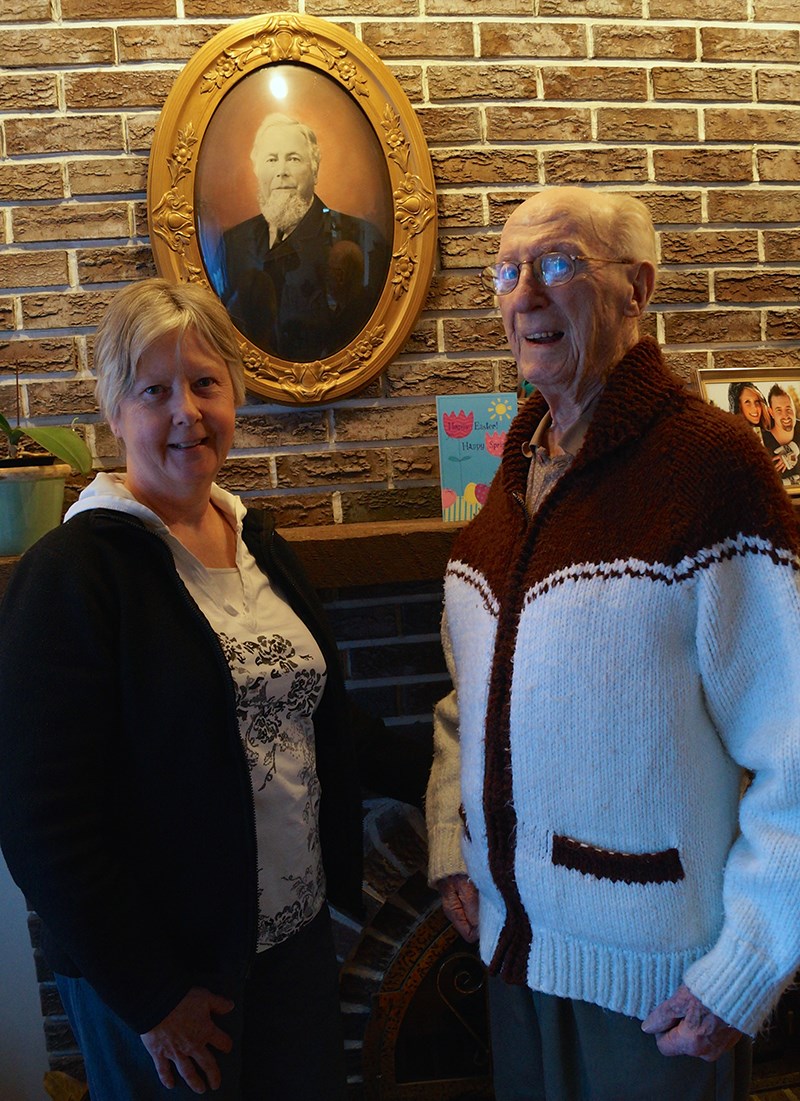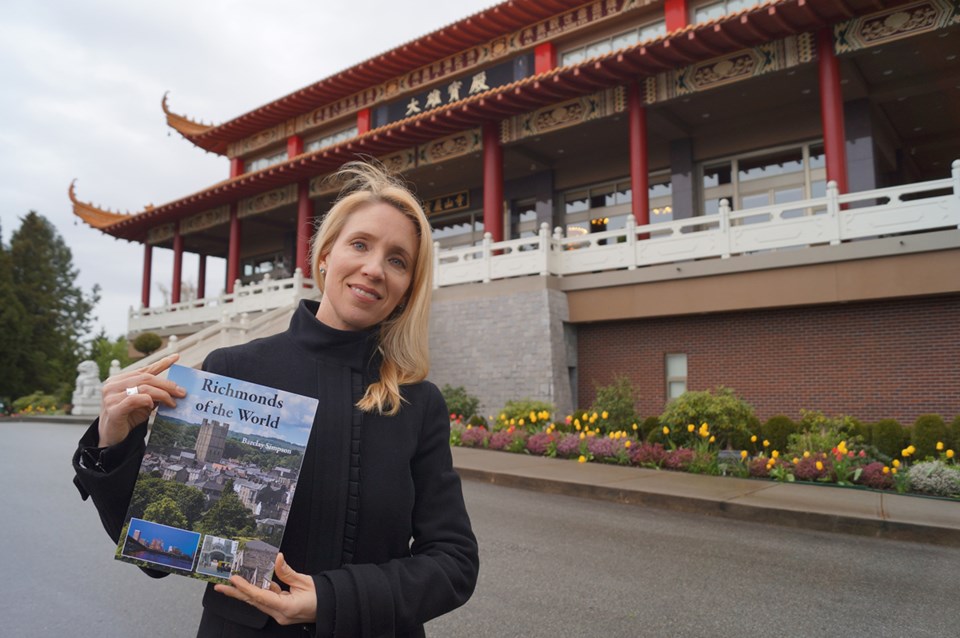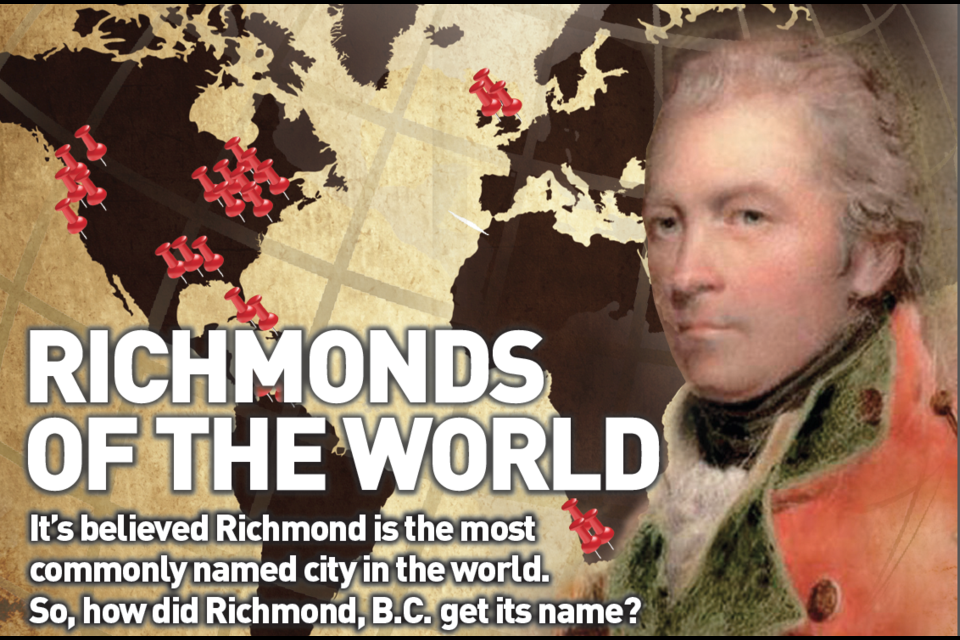So you’re a Richmondite. Join the club. It’s a big one.
According to British author and toponymist Barclay Simpson, Richmond is the most common place name in the world. All in all, Simpson, a resident of the original Richmond, in Yorkshire, England, claims there are over 90 places with the name Richmond. In his recently published book, Richmonds of the World, Simpson highlights 55 of them (See website here).
“I found there were six Richmonds in Canada, from Nova Scotia across to British Columbia. There are 45 in the United States alone and more across the world, including England, Germany, the Czech Republic, Tasmania and the Caribbean,” explained Simpson.
So, how did the name Richmond spread like fire?
“Several generations of the Duke of Richmond, in the 19th century, sailed around the world and kept naming places after themselves,” he said.
The first Richmond is found in Yorkshire, England. In 1071 a French Count named Alain Le Roux (Alan the Red), of Brittany, was granted the land - once controlled by Vikings and known as the districts of Gilling and Hang - by William the Conqueror, a Norman, after he had slaughtered its inhabitants.
Le Roux built a castle on a big hill overlooking the fast flowing Swale River. The word Richmond derives from the French words riche and monte, or “strong hill.”
While Richmond, B.C. has nary a mound of grass, let alone a hill, it does share a fast flowing river with its namesake parent.
“There’s not really anything (topographically or geographically) in common between Richmonds. But there is a rich tapestry across the continents and they’re all very different. That’s what I like about it, really,” said Simpson.
“There was nothing too historical about your Richmond there, but it seems like a lovely place, all the same,” Simpson told the Richmond News, over the phone.
The first Richmond in North America is found in the Commonwealth of Virginia. A city of about 215,000 residents, it is the biggest Richmond in the world, although Richmond, B.C. is likely set to change that in the upcoming decade. In 1782 it became the state capital and remains one of the oldest cities in the U.S.
Much like the one in B.C. First Nations (Powhatan) first inhabited Virginia’s Richmond. European settlers named Richmond, Virginia in 1607, after Richmond-upon-the-Thames in London. Richmond, Virginia has the two main common traits of Richmond, Yorkshire, in that it has a fast-flowing river, the James, and a large hill in the centre where the Capitol building is situated. True to form, many of the districts and roads are English-inspired.
There are four standing theories behind where Richmond, B.C. directly got its name from. All of them, obviously, trace back to Richmond, Yorkshire, but Simpson notes each Richmond has its own path.
“Many of the Richmonds across North America have the same naming roots, but could come from different Dukes,” explained Simpson.
“Your Richmond was probably named after the Governor General of British North America (Charles Lennox, 4th Duke of Richmond),” Simpson told the News.
The Township of Richmond, Lennox County, Ontario is where Richmond, B.C. pioneer John Wesley Sexsmith was born.

Sexsmith was one of 25 pioneers to sign the petition that incorporated the Township of Richmond in 1879.
His great-great granddaughter Julia Boak, who lives in Seafair, contends it was Sexsmith that led the way in creating the township, given his history in Lennox County working as a city clerk and businessman.
Boak says Richmond was named a township because that’s how municipalities in Ontario operated, and Sexsmith modeled Richmond B.C. from such a system.
Boak cares for her father, 94 year-old Rod Sexsmith, the great grandson of John Wesley.
“He named the town after Richmond, Ontario, where he came from,” said Rod.
Another theory, according to Richmond archivist Bill Purver, is that Richmond B.C. derived its name from pioneer farmer Hugh McRoberts, since the first published reference to “Richmond” on Sea or Lulu islands was in 1862. McRoberts’ daughter Jennie chose the name because the Fraser River reminded her of Richmond, New South Wales, Australia.
Meanwhile W.D. Ferris, another signatory of the petition, stated his hometown was Richmond, Surrey, England (the one in Surrey is the second oldest Richmond in the world, after King Henry VII, holding the title Earl of Richmond, renamed his royal palace at Sheen, to Richmond in 1499).
Furthermore, the wife of Hugh Boyd, the first reeve (mayor) of Richmond, held the first council meeting in her living room. She was from the original Richmond in Yorkshire, and it’s contended she had a role to play in the naming of the township.
Purver said the issue remains a hot-button topic amongst the surviving pioneer descendents and when asked what theory he thought was right, he would only speak “off the record.”
While Boak seems adamant that it is the Sexsmith legacy that resulted in today’s name of Richmond, B.C. she says it is difficult to decipher exactly what went on during the formative years of Richmond.
“The problem with Richmond’s history is that it is scattered all over. It’s in Victoria, in archives in Vancouver, in libraries, at the Richmond Archives,” she said.
Perhaps one of the more interesting legacies of all this history is the modern day mix-ups that occur between the Richmonds of the World.
The Richmond Newsfrequently receives emails from small towns in the U.S. named Richmond and, more often, letters and community bulletins from Richmond, Virginia.
The other week, reporter Alan Campbell was tipped off to some sultry allegations occurring at a Virginia strip club.
At the archives, Purver says he gets the odd mix-up as well.
The same is true on the opposite end.
The City of Richmond, California bylaw department said it sometimes gets calls from Richmond, B.C. residents. As well, their residents may get confused with Richmond B.C.’s website, which ends in CA - Richmond.ca
On Twitter, Richmond, Virginia tends to dominate the “Richmond” hashtag, and Tweeters from any Richmond must usually place an acronym beside their intended Richmond hashtag in order to reach the proper audience: so, #RichmondVA, #RichmondBC or #RichmondCA.
As noted by Simpson, there may not be a purposeful, particular trait amongst all the Richmonds, although a river seems to be common among many of them.
The closest Richmond to Richmond, B.C. is Richmond, California.
The two cities have both their similarities and differences.
The one in California is part of the San Francisco Bay’s “iron triangle” and is very industrial. It was also once known as the “murder capital” of the U.S. a decade ago - surely a far cry from Richmond, B.C., a city that rarely sees homicides for its size.
Since then things have cleaned up in Richmond, California, according to Mayor Tom Butts.
Meanwhile the city must cope with an ever-growing port as it manages safe, green recreational activities for its residents (Bay area municipalities are forming a large pedestrian/cycling path around the bay, just as Lower Mainland ones are working on a Fraser perimeter trail).
Butt said he doesn’t know much about his northern sister.
“Not much. I know it’s in Vancouver and when I’ve been there I’ve always thought if I had an extra day I’d like to go look around. But I’ve never had an extra day,” he said.

That’s the job of Michelle Dunn, communications manager at Tourism Richmond, who works to make Richmond a tourist destination unto its own.
Dunn helped Simpson put together facts about Richmond, B.C. She says Richmond, B.C. is perhaps the most unique Richmond these days given its association to Chinese immigration and culture.
“We are the only Richmond on the doorstep of the East. We have fantastic recreational opportunities, a rich heritage starting with the salmon fishery and so many cultures coming together. We’re proud of what we have here,” said Dunn.



